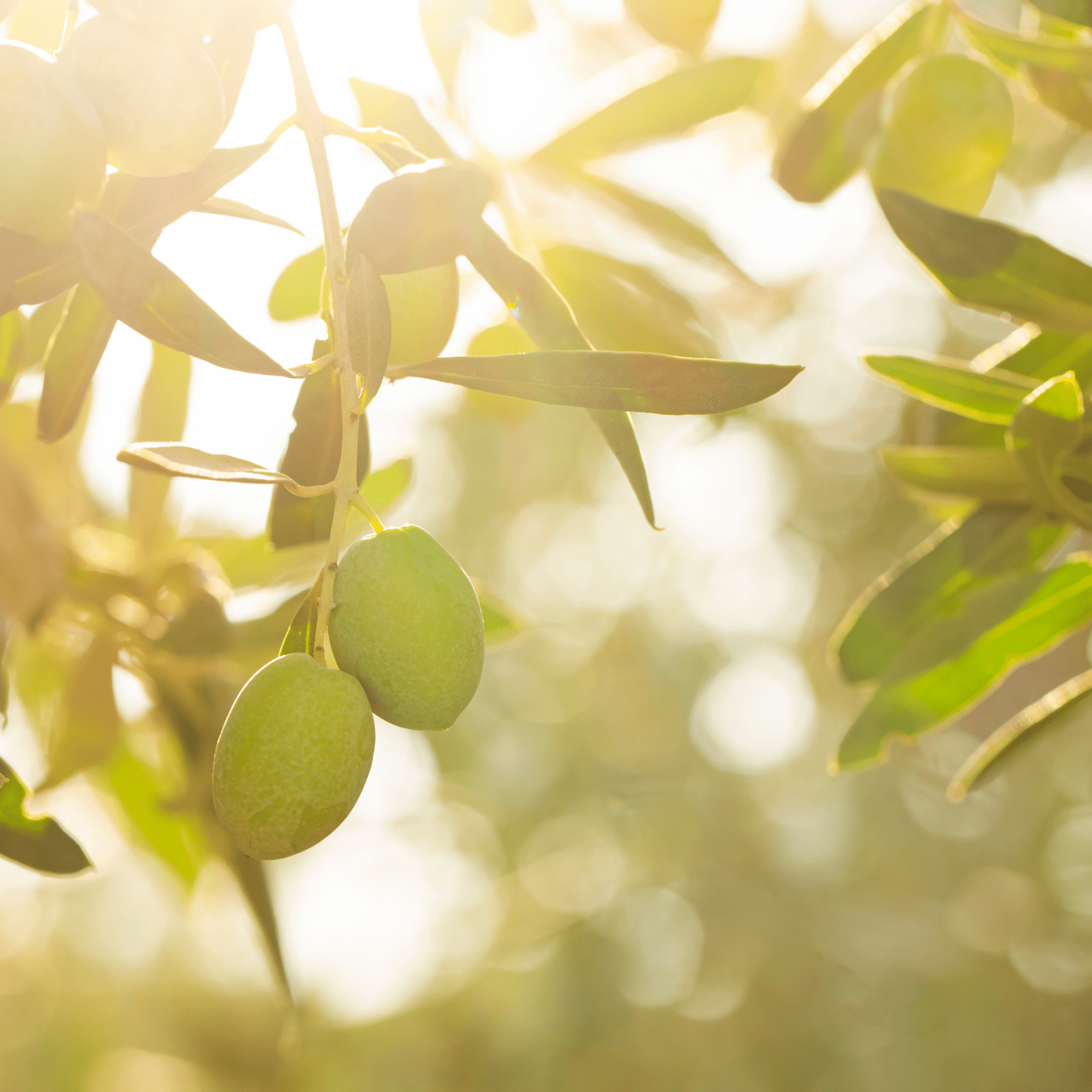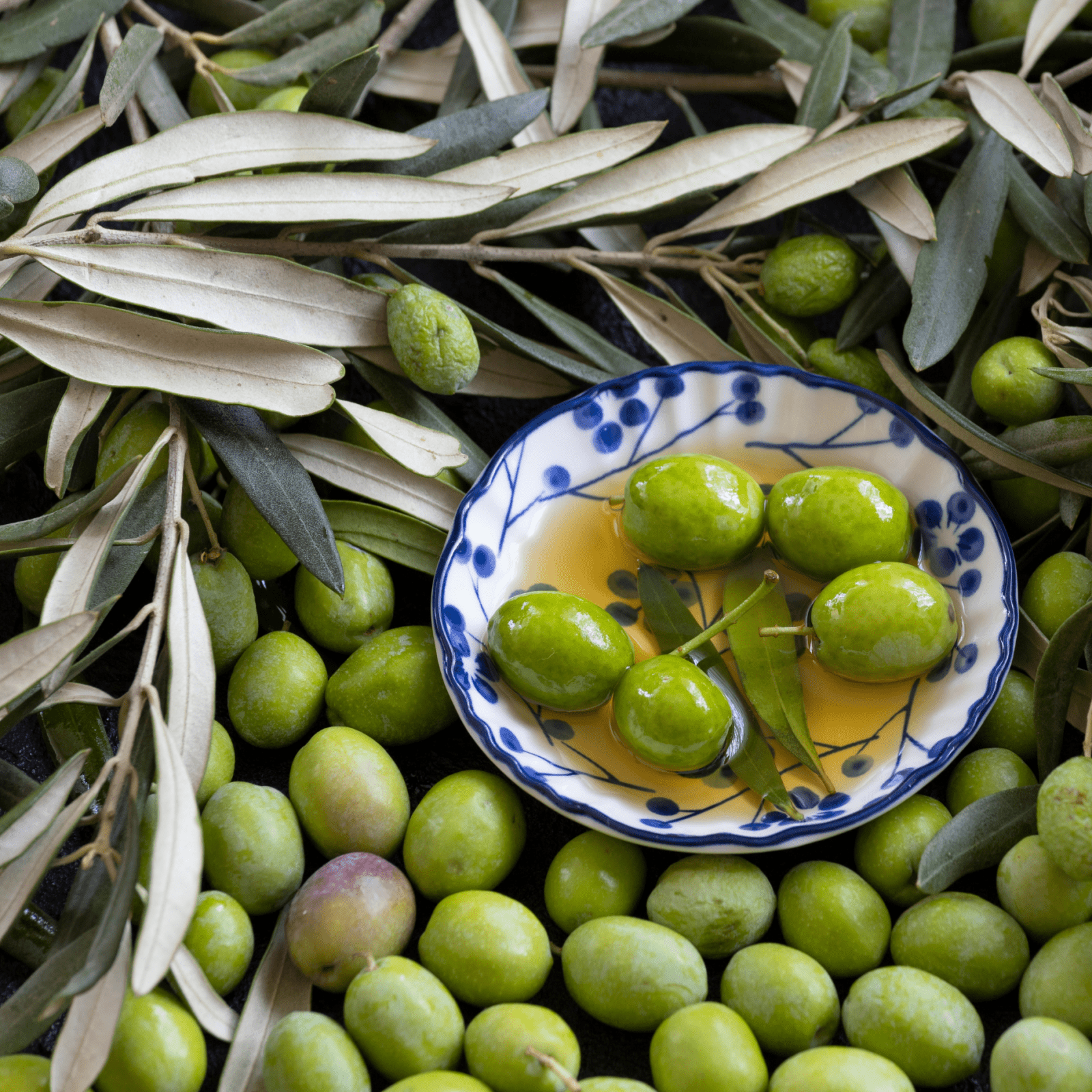
Ever wondered why the Mediterranean diet is so highly praised? It is light on meat, and full of vegetables, fruit and legumes with olive oil as the primary source of fat. It is thought that the polyphenols in olive oil are part of what makes this diet so healthy. These nutrients are a valuable asset for better health and nutrition. Polyphenol-rich olive oil is more than just a cooking oil. It's a superfood full of antioxidants. In addition to its culinary importance, this is what makes it a fundamental benefit of the Mediterranean diet.
Extra virgin olive oil is especially good for you as it contains many types of polyphenols which offer health benefits beyond just tasting good.
At McEvoy Ranch, a family-owned 550-acre working farm in Petaluma, California, we have dedicated over three decades to producing high-quality extra virgin olive oil (EVOO), known for its rich flavor and health-promoting properties thanks in part to its high polyphenol count.
In this article we will explore the health benefits of polyphenol rich olive oil, how it can improve cardiovascular health and improve cognitive function.
Key Takeaways
-
Extra virgin olive oil has higher polyphenol content than other oils
-
The Mediterranean diet heavily incorporates olive oil for its flavor and health benefits
-
Polyphenols act as powerful antioxidants in the body
-
Olive oil consumption is linked to lower risks of heart disease and stroke
Health Benefits of Polyphenols in Olive Oil
Polyphenols are naturally occurring compounds in olive oil that provide a wide range of health benefits. These powerful substances are important components of virgin olive oil which has been extensively studied for its ability to enhance overall well-being, from cellular protection to improved heart health.
Through incorporating olive oil into your diet, especially extra virgin olive oil, you can support your body in many ways.
Antioxidant Effects and Cellular Protection
Polyphenols in olive oil are potent antioxidants that play a critical role in protecting your cells from oxidative stress. Oxidative stress occurs when harmful molecules called free radicals damage cells, leading to premature aging and increased risk of chronic diseases.
A key polyphenol in olive oil, hydroxytyrosol, is especially effective in neutralizing free radicals, which helps to safeguard your skin, eyes, and various tissues throughout the body.
Studies have shown that hydroxytyrosol can help reduce the risk of degenerative conditions such as macular degeneration and skin disorders by protecting these areas from oxidative damage.
Furthermore, it has been shown to protect DNA from oxidative damage which may reduce the risk of certain cancers, enhancing long-term health and wellness.
Heart Health and Anti-inflammatory Benefits
Polyphenols are particularly beneficial for heart health. They help reduce blood pressure, lower harmful LDL cholesterol, and improve circulation. One notable polyphenol, oleocanthal, offers anti-inflammatory benefits comparable to ibuprofen, making it especially useful in managing chronic conditions like arthritis and diabetes.
|
Polyphenol |
Health Benefit |
|
Hydroxytyrosol |
Cellular protection, antioxidant effects |
|
Oleocanthal |
Anti-inflammatory properties, pain reduction |
|
Oleuropein |
Heart health, blood pressure regulation |
Incorporating polyphenol-rich extra virgin olive oil in your diet has many health benefits and can lower your risk of heart disease and stroke by 19%. It may also help with weight management and improve brain function. Through picking a fresh, high-quality extra virgin olive oil, you can enjoy these health benefits every day.
How Polyphenols Help Reduce Oxidative Stress
Polyphenols in olive oil are powerful compounds that play a vital role in fighting oxidative stress, a process linked to various chronic diseases and accelerated aging. These antioxidants work by neutralizing harmful free radicals, unstable molecules that can damage cells and tissues.
Through protecting the body from oxidative damage, polyphenols support overall health and longevity.
Role of Polyphenols in Fighting Free Radicals
Free radicals are unstable molecules produced naturally by the body through metabolism or due to external factors like pollution, UV rays, and poor diet. When free radicals outnumber antioxidants in the body, oxidative stress occurs which can lead to cell damage, inflammation, and the onset of chronic diseases such as cancer, heart disease, and neurodegenerative conditions.
Polyphenols, found in extra virgin olive oil, act as scavengers that neutralize these free radicals before they can cause harm.
Polyphenols and Aging
The antioxidant properties of polyphenols extend beyond the prevention of chronic diseases—they may also play a key role in slowing down the aging process. Oxidative stress is a major factor in aging, as it accelerates the breakdown of cells and tissues, leading to wrinkles, decreased organ function, and cognitive decline.
Through neutralizing free radicals, polyphenols may help protect cells from premature agingand maintain the integrity of DNA. This may reduce the risk of age-related diseases such as Alzheimer's, cancer, and cardiovascular issues.
People following a Mediterranean diet, rich in olive oil, have lower rates of age-related illnesses. Higher olive oil consumption leads to a 31% reduced risk of cancers, further emphasizing the role of polyphenols in healthy aging.
Adding polyphenol-rich olive oil to your meals can help fight oxidative stress and support healthy aging. Choose early-harvest olive oils from high phenol varieties such as Coratina, Picual, and Koroneiki for the most polyphenols.
Benefits for Cardiovascular Health
Olive oil, especially extra virgin olive oil which is rich in polyphenols, is exceptionally beneficial for heart health. In combination with the healthy monounsaturated fats found in all olive oil, these bioactive compounds play a pivotal role in managing cholesterol levels, reducing inflammation, and preventing heart disease. Let’s explore how polyphenols contribute to keeping your heart healthy.
Polyphenols and Cholesterol Management
Polyphenols in olive oil are crucial in maintaining a healthy cholesterol balance. They help by:
-
Lowering LDL (bad) cholesterol: Elevated levels of LDL cholesterol contribute to the buildup of plaque in the arteries, leading to a condition called atherosclerosis. In addition to the well-established benefits of olive oil’s healthy fats, polyphenols, particularly oleuropein and hydroxytyrosol, have been shown to reduce LDL cholesterol levels, minimizing plaque formation.
-
Raising HDL (good) cholesterol: HDL cholesterol helps to remove excess LDL cholesterol from the arteries, transporting it to the liver for excretion. Polyphenols can help increase HDL levels, which is essential for clearing arterial blockages and promoting better cardiovascular health.
-
Preventing the oxidation of LDL cholesterol: When LDL cholesterol oxidizes, it becomes more likely to damage the arterial walls, leading to inflammation and the progression of atherosclerosis. Polyphenols act as powerful antioxidants, helping to prevent LDL from oxidizing and thus slowing the development of heart disease. Research shows that people who consume extra virgin olive oil rich in polyphenols have lower levels of oxidized LDL, reducing their risk of cardiovascular issues.
Reducing the Risk of Heart Disease
Polyphenols protect against heart disease through several mechanisms:
-
Lowering blood pressure: High blood pressure (hypertension) is a significant risk factor for heart disease and stroke. Polyphenols, such as oleocanthal, have vasodilatory effects, meaning they help blood vessels relax, promoting better blood flow and lowering blood pressure.
Some studies suggest that individuals consuming polyphenol-rich extra virgin olive oil may experience a reduction in blood pressure and an 8% reduction in stroke mortality, potentially lowering the need for hypertension medication.
-
Reducing inflammation in blood vessels: Chronic inflammation in blood vessels can lead to the development of heart disease.
Polyphenols have anti-inflammatory properties, helping to reduce inflammation within the vascular system, which in turn improves overall cardiovascular health.
-
Improving endothelial function: The endothelium is the inner lining of blood vessels, responsible for regulating blood pressure and clotting.
Polyphenols enhance endothelial function by increasing nitric oxide production, which helps blood vessels dilate and improves circulation. This improved vascular health reduces the risk of developing heart disease.
Incorporating polyphenol-rich olive oil into your diet has been associated with a lower incidence of cardiovascular diseases. The PREDIMED study, a large clinical trial, found that a Mediterranean diet supplemented with extra virgin olive oil significantly reduced the risk of heart attacks, strokes, and death from cardiovascular causes compared to a low-fat diet. These findings highlight the powerful impact of olive oil polyphenols on heart health.
|
Cardiovascular Benefit |
Effect of Polyphenols |
|
Cholesterol Management |
Decrease LDL, Increase HDL |
|
Atherosclerosis Prevention |
Inhibit LDL oxidation |
|
Blood Pressure |
Lower systolic and diastolic pressure |
|
Heart Disease Risk |
Reduce overall risk factors |
Although all olive oil with its healthy monounsaturated fats is heart-healthy, adding polyphenol-rich extra virgin olive oil to your meals may be an extra-smart move for your heart. It can further lower your risk of heart problems.
Polyphenols and Cognitive Function
Polyphenols in olive oil have been shown to benefit brain health in several ways. These powerful compounds help maintain cognitive function and reduce the risk of neurodegenerative diseases, such as Alzheimer’s and Parkinson’s.
Through protecting brain cells and improving overall brain function, polyphenols can play an essential role in long-term mental well-being.
Studies Linking Polyphenols to Improved Brain Health
A study with 26 people looked at how extra virgin olive oil (EVOO) affects the brain. It showed that EVOO improved scores on tests of thinking skills and behavior.
Those who ate 2 tablespoons of of EVOO every day had less blood-brain barrier issues and better brain connections. This means polyphenols might help keep the brain healthy and sharp.
Can Polyphenols Prevent Neurodegenerative Diseases?
Polyphenols could reduce diseases like Alzheimer's and Parkinson's by 28%. In the study, both EVOO and regular olive oil groups had lower blood levels linked to these diseases. The levels of Aβ42/Aβ40 and p-tau/t-tau, related to Alzheimer's, were significantly reduced.
More studies are needed, but these results are promising. Polyphenol-rich extra virgin olive oil might help keep the brain working well and lower the risk of brain diseases.
Weight Management and Polyphenols
Polyphenols in olive oil are key for managing weight and metabolism. Studies show that eating polyphenol-rich olive oil helps with weight goals and prevents obesity.
How Polyphenols Aid Fat Metabolism
A study in the European Journal of Clinical Nutrition found that eating a Mediterranean diet with lots of virgin olive oil helped prevent weight gain.
Supporting Healthy Weight with Polyphenol-Rich Olive Oil
Replacing other fats in your diet with polyphenol-rich extra virgin olive oil can help keep your weight healthy. The Mediterranean diet, full of olive oil, is linked to fewer cases of obesity. Polyphenols can control hunger and lower inflammation that can lead to obesity.
|
Benefit |
Impact on Weight Management |
|
Increased Fat Oxidation |
Helps burn fat more efficiently |
|
Appetite Regulation |
Supports portion control |
|
Anti-Inflammatory Properties |
Reduces obesity-related inflammation |
|
Antioxidant Effects |
Promotes overall metabolic health |
Substituting high-quality, polyphenol-rich extra virgin olive oils for other fats in healthy meals can help with weight management and better health.
Final Thoughts
Polyphenol-rich olive oil is more than just tasty. It's incredibly beneficial for your health, protecting your heart and boosting your brain. Adding 20-40 grams of this oil to your daily meals can greatly improve your health.
The Mediterranean diet, full of olive oil, is known for its health benefits. Experts often suggest extra virgin olive oil as a key part of a healthy diet.
The everyday choices you make significantly impact your health. Using polyphenol-rich extra virgin olive oil in cooking and dressings in place of other fats adds flavor and health benefits. It helps with weight control and may lower the risk of brain diseases.
FAQ
What are the health benefits of olive oil?
The health benefits of olive oil are numerous and well-documented. Extra virgin olive oil is rich in healthy fats, particularly monounsaturated fats, which are known to support heart health. Additionally, it contains a variety of antioxidants, including polyphenols, which can reduce oxidative stress and inflammation in the body.
Regular consumption of olive oil has been linked to a lower risk of developing chronic diseases such as cardiovascular disease, diabetes, and certain cancers. Furthermore, the anti-inflammatory effects of polyphenols may help in reducing symptoms of arthritis and other inflammatory conditions.
What are polyphenols and why are they important?
Polyphenols are a diverse group of naturally occurring plant compounds found in various foods, including fruits, vegetables, tea, coffee and olive oil. They are recognized for their antioxidant properties, which protect the body from damage caused by free radicals. The beneficial effect of polyphenols includes the potential to support heart health, improve blood sugar levels, and reduce inflammation.
Different types of polyphenols, such as flavonoids and phenolic acids, can have varying health effects, contributing to the overall health benefits associated with a diet rich in dietary polyphenols.
How does extra virgin olive oil differ from other types of olive oil?
Extra virgin olive oil is the highest quality of olive oil available. It is made by mechanically (not chemically) extracting the oil from olives and contains the highest levels of beneficial compounds, including polyphenols. Other types of olive oil, such as refined or pure olive oil, undergo processing that removes some of these healthful compounds .
The high antioxidant content and the rich flavor profile of extra virgin olive oil make it a preferable choice for health-conscious consumers. Moreover, extra virgin olive oil retains all of the natural flavors and nutrients of the olive making it the healthiest and most delicious choice.
Certified Organic
By CCOF
Sustainably Produced
At Our Ranch
Early Harvested
High Polyphenols
Award Winning
Extra Virgin Olive Oil






